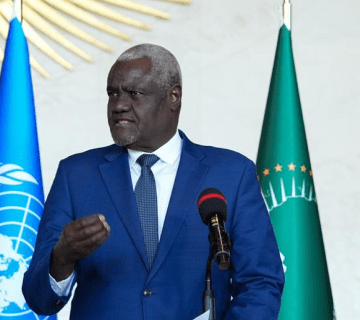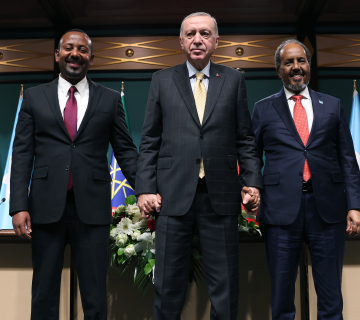Djibouti’s recent developments have been driven by fourregional and international factors: the end of the Ethiopian – Eritrean ‘war’, the 2017 Qatar diplomatic crisis, the impact of Ethiopia’s economic transformation and growth of trade, and shifts in US and Chinese regional policies.
Ethiopia and Eritrea officially made peace with each other in July 2018, marking the end of years of enmity, and the start of a wave of positive diplomatic developments. Djibouti and Eritrea had border struggles of their own, starting in 2008 and further escalating after Qatar withdrew its peacekeeping troops in 2017 following Qatar’s diplomatic crisis. In September 2018, Djibouti and Eritrea also decided to normalize their relations.
Peace between Ethiopia and Eritrea marked another significant change for Djibouti. The Ethiopian animus with Eritrea meant that shared infrastructural connections between the countries that pre-dated Eritrean independence could not be used. As the most stable country in the Horn of Africa region, Djibouti has been a natural alternative for Ethiopia, although recently Addis Ababa has also made overtures to Somalia and Somaliland for the use of Berbera port in Somaliland.Djibouti has acquired over 90 per cent of Ethiopia’s port traffic over the last two decades due to the anonymity between Ethiopia and Eritrea. Ethiopia pays USD 1.5 billion annually for Djibouti’s port services. With the new peace deal between Eritrea and Ethiopia, Djibouti could lose a lot of Ethiopia’s export. However, the completion of the Ethiopia-Djibouti railway in January 2018 ensuresa logistical connection between the two countries. Additionally, Djibouti’s port services are far superior to those of other countries in the region. Finally, Ethiopia’s rapid economic development and transformation, with a country of over 100 million people, might prove too much for Djibouti’s deep-water ports to handle.
Djibouti’s strategic geographical location, next to the Bab-el-Mandeb Strait, a narrow passage between the southern tip of the Red Sea and the Indian Ocean, has been at the centre of international attention for the last decade. The United States has its only permanent military base on the African continent, Camp Lemonnier, in Djibouti.China has recently completed their first foreign base anywhere in the world in Djibouti, right across from Camp Lemonnier. The presence of foreign powers in Djibouti might create tensions between these powers, and between these powers and the host country.
Djibouti has become more dependent on China over the last years, which became increasingly visible in 2018. Djibouti is projected to take on public debt worth around 88 percent of the country’s overall USD 1.72 billion GDP, with China owning the lion’s share of it. Part of Chinese President Xi Jinping’s Belt and Road initiative, aimed at reviving and expanding the Silk Road trading routes over land and at sea, is the development of large infrastructure projects. Large projects, such as the new Djibouti International Free Trade Zone, a USD 3.5 billion venture with Chinaare financially destabilizing for a small country, and Djibouti currently faces very unstable debt levels.
When China grows more preponderant, it might leverage its growing might to impose its will on other states to further its interests.Sri Lanka owes more than USD 8 billion to Chinese sovereign-backed banks at interest rates as high as 7 percent. Due to this debt, Sri Lanka was last year forced to sign of a 70 percent stake, and a 99-year lease to the Chinese-built port at Hambantota. US lawmakers have already expressed concern that Djibouti, facing mounting debt and increasing dependence on extracting rents, might be pressured to hand over control of Camp Lemonnier to China. This would enhance China’s power projection and clearly demonstrate China’s growing hegemonic aspirations.
Djibouti needs to make sure that it does not become completely dependent on one source of funding, and that it retains independence in its decision making.Infrastructure programs and development look tempting, but if Djibouti bites of more than it can chew,it risks losing that sovereignty. Additionally, Djibouti needs to keep attracting Ethiopia’s export, despite the recent opening-up of Eritrea as a possible alternative. Come 2019, these will be Djibouti’s main challenges.



